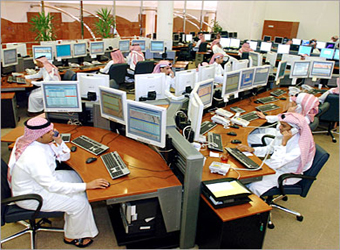Gulf stock markets were on Tuesday weighed down by weak oil prices as Saudi Arabia pulled back despite hopes for positive news from index compiler MSCI, while Qatar closed at its lowest level since it was hit by a diplomatic crisis early this month.
MSCI was due after the close on Tuesday to announce whether it will launch a review of Saudi Arabia for possible inclusion in its emerging market index; inclusion would bring tens of billions of dollars of fresh foreign money.
The Saudi index surged 2.4 percent on Monday after Mohammed El-Kuwaiz, vice chairman of the Capital Market Authority, was quoted as saying by the Asharq al-Awsat newspaper that he expected inclusion by the end of 2018.
On Tuesday, the index rose as much as 0.6 percent early on but closed 1.3 percent lower in thin trade. The three top losers were banks which had surged in the past week because of a belief that foreign funds would flow into them in the event of a positive MSCI decision.
Saudi British Bank, for example, pulled back 4.7 percent to 24.30 riyals after jumping 14 percent in the past four days.
Petrochemical blue chip Saudi Basic Industries, which would be a key Saudi component of MSCI’s emerging market index if the upgrade happens, fell 0.8 percent.
Though fund managers agree MSCI inclusion would be bullish for the Saudi market, many think fundamentals are not very attractive at present, with valuations significantly above those of the MSCI emerging market average, and Saudi Arabia’s introduction of a sales tax looming next year. So the market may have little room to rally in coming months.
Dubai’s index fell 0.2 percent as builder Drake & Scull, the most heavily traded stock, slid 3.0 percent after saying it had obtained regulatory approval to start a capital restructuring after heavy losses.
National Central Cooling Co (Tabreed) rose 3.8 percent to 2.20 dirhams but came far off the day’s high of 2.37 dirhams. It soared its 15 percent daily limit on Monday, when France’s Engie said it had agreed to buy 40 percent of Tabreed for 2.8 billion dirhams ($763 million) from Mubadala.
Abu Dhabi’s index dropped 0.8 percent as Dana Gas pulled back 4.4 percent. It had gained 66 percent this month on what some brokers said was buying by a strategic investor; late on Monday Goldilocks Investment Co, part of Abu Dhabi Financial Group, said it had bought 5 percent of the firm.
Qatar’s index slipped 1.5 percent to 8,934 points, its lowest finish since January 2016. It remains depressed by economic sanctions against Doha announced by Saudi Arabia and other Arab states on June 5, and has now lost 10 percent since then.
Some investors have been hoping for a diplomatic resolution but a top United Arab Emirates official said on Monday that Qatar’s isolation could last for years.
Many banks dropped; Doha Bank fell 2.1 percent. Qatari banks have been weak because of concern about increases in their funding costs after other Gulf countries imposed sanctions on Qatar early this month, accusing it of supporting terrorism.
Egypt’s index fell 0.7 percent; Orascom Telecom Media, the most heavily traded stock, plunged 15 percent as it went ex-dividend.
HIGHLIGHTS
SAUDI ARABIA
* The index dropped 1.3 percent to 6,953 points.
DUBAI
* The index fell 0.2 percent to 3,452 points.
ABU DHABI
* The index dropped 0.8 percent to 4,456 points.
QATAR
* The index sank 1.5 percent to 8,934 points.
EGYPT
* The index fell 0.7 percent to 13,416 points.
KUWAIT
* The index fell 0.7 percent to 6,783 points.
BAHRAIN
* The index rose 0.2 percent to 1,319 points.
OMAN
* The index dropped 0.5 percent to 5,195 points.
Source: Reuters










